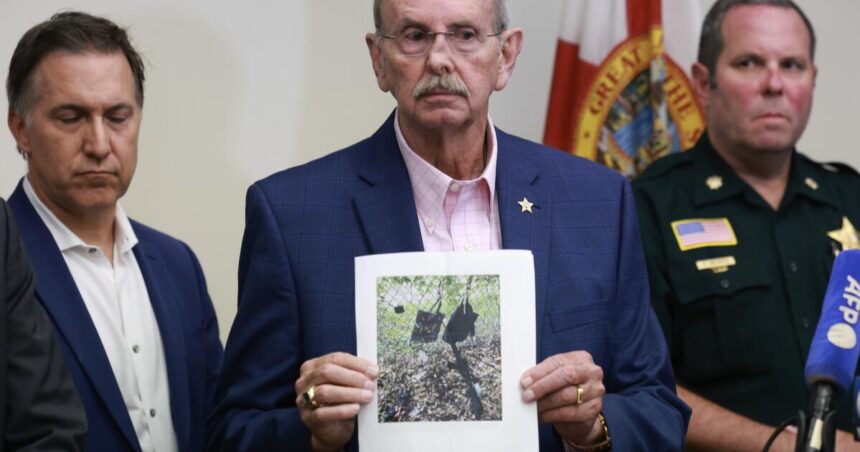A gunman came within deadly distance of former President Donald Trump on Sunday, reigniting fears of violence in US politics, a development analysts said was entirely unexpected as Trump’s supporters vowed to become even more determined to win reelection.
Just two months after an assassin’s bullet sliced off President Trump’s ear in Butler, Pennsylvania, the Secret Service opened fire on a man with an assault rifle who was hiding in bushes less than 500 yards from the former president.
The suspect’s identity and motive had not been released by late afternoon, but supporters of the former president quickly rallied around him.
“Fight! Fight! Fight! Trump 2024,” one supporter wrote on Trump’s Truth Social platform.
“The greatest warrior,” agreed Kash Patel, a former appointee to Trump’s Defense Department.
In another post, Trump appears as a heroic figure striding across a battlefield with his fist raised. “I am safe and well!” the message read. “Our President Donald Trump,” followed by an image of his hands together in prayer.
After the first assassination attempt on President Trump in July, supporters and even neutral political commentators predicted that the violence would give Trump a commanding lead over President Biden.
But a lot has changed since then, most notably after Biden’s debate missteps led him to drop out of the presidential race in favor of Vice President Kamala Harris, who, by many measures, has held the lead in the race ever since.
“Donald Trump was at the height of his enthusiasm right after the Pennsylvania shooting and heading to his party convention,” said Mike Madrid, a Republican political consultant and ardent Trump critic. “The Republicans were absolutely certain they were going to win the election in a landslide victory.
“This will give Harris’ supporters another reason to show up to the rallies and maybe give those on her side a reason to say, ‘This is what we’re fighting for,'” Madrid said. “But the enthusiasm gap is still in Harris’ favor and that’s not going to change.”
Longtime Republican pollster Frank Luntz said: “I was convinced that Trump’s defiant attitude after the shooting (in June) would help his reelection. To my surprise, it wasn’t even the most important event in the campaign. This second shooting doesn’t seem to have any impact either. I can’t see anything short of a war having a meaningful, measurable impact on a critical segment of the population.”
Colin Clark, research director at the Soufan Group, a global intelligence and security consulting firm, said his group recently hosted a major summit on political violence attended by many U.S. government officials and prominent academics, and that Sunday’s incident would not have come as a surprise to attendees.
Clark said one of the major takeaways from the conference was that the US is likely to “see a lot more political violence” in the future, given “the general polarization in this country, where everyone is heavily armed and angry.”
“No matter which candidate wins, many people are concerned about what will happen after November,” he said.
“There’s so much stuff out there to piss people off these days and it’s so easy to get hold of a weapon. I think getting close to a president or a former president is easier than a lot of people thought,” he said.
He said the data showed far-right violence was the biggest threat, but far-left violence was also dangerous.
“As the far-right, the neo-Nazi scumbags, become more visible, there’s more mutual radicalization,” he said.
Clark said he fears that anger and fear will only increase as President Trump continues to stoke daily political rhetoric that has not subsided since the first assassination attempt.
“We’re right in the middle of it, and as it intensifies, I’m just very concerned,” he said.
“A responsible leader should often talk about uniting the country rather than dividing it,” he said, but he doesn’t expect that from Trump.
“The whole political climate is getting more heated and more acerbic, and that’s what sells. It’s part of the social media era, and being moderate doesn’t get you more clicks and more followers,” he said.
Some of Trump’s supporters say his harsh rhetoric, particularly accusations that he is a threat to democracy, has emboldened those who want to do him harm.
“Democrats put Trump’s life at risk by calling him a danger to democracy,” one follower said on Truth Social on Sunday. “On July 13th there was an assassination attempt on Trump, yet Democrats continue to call him a danger! Now there’s another assassination attempt, this time in West Palm Beach!”
Dr. Garen Wintemute, director of the Violence Prevention Research Program at the University of California, Davis, has studied political violence for many years. Since 2022, his research group has been conducting a large-scale, nationally representative, annual survey of Americans’ support for political violence and their personal willingness to participate in it.
The group just got back its 2024 data, collected before the assassination attempt on Trump, and Wintemute said it’s encouraging that it shows Americans’ acceptance of political violence hasn’t increased since 2023.
In 2022, nearly a third of respondents said they believed violence is usually or always justified to advance at least one political goal, with Republicans and MAGA-supporting Republicans more likely to think so than others, along with white supremacists, conspiracy theorists and gun owners.
In 2023, racists, sexists, anti-Semites, homophobes and transphobes were similarly more likely to believe that violence is justified to advance political aims.
Still, Wintemute said two-thirds of respondents in 2022 and three-quarters in 2023 rejected political violence. And among those who said they believed violence was justified for at least one political goal, the majority said they would not want to engage in violence themselves.
Wintemute said the latest data showed “there was no increase in support for political violence from 2023 to 2024, but there was an increase from 2022 to 2023.”
He said this was “good news” given that 2024 is an election year and that he expected support for political violence to increase.
Wintemute said that this year, for the first time, they asked people how likely they would join as a combatant if large-scale violence erupted, and again found “good news”: “The vast majority of people, roughly 85 percent, said they were unlikely to join as a combatant.”
Just as important, he said, is the finding that among those who said they would not become combatants, most said they would not change their minds even if urged by family or friends, but among those who said they would become combatants, many said they would change their minds.
Wintemute said this shows that “we must do all we can to prevent retaliatory violence by speaking out against it.”
“When a spark of political violence flies, it is our job to wet the ground so that the spark stops there and doesn’t become a conflagration — so that there is no reaction,” he said.
“For the majority of us who reject violence, it is our job to speak out about it.”
Another scholar who has surveyed Americans’ attitudes toward political violence said more needs to be done to condemn such attacks.
“All political leaders and presidential candidates should immediately condemn political violence, whether coming from the left or the right, and not wait for an escalating spiral to occur,” said Robert A. Pape, a political scientist at the University of Chicago.
Pape surveyed more than 2,000 Americans in late June, ahead of the July 13 assassination attempt on President Trump. The survey found a disturbing trend of people across the political spectrum saying violence was justified to eliminate political movements.
A poll by the Chicago Security Threat Project released in June found that 6.9% of Americans, or 18 million adults, believe it would be justified to use force to return Trump to the White House. In a separate question, 10% of Americans, or 26 million adults, said they believed it would be justified to use political violence to stop Trump from becoming president again.
The researchers found that millions of people on both sides who said political violence would be justified also own guns.
“Unfortunately, what’s happening is entirely consistent with our polling results,” Pape said, “which show that not only are there people who support using force to stop Trump from becoming president, but that many of those people are gun owners.”









